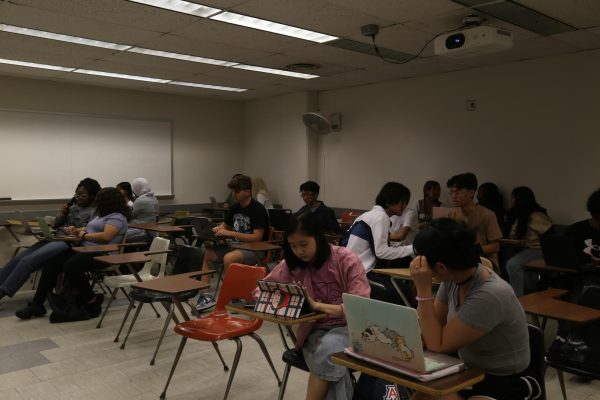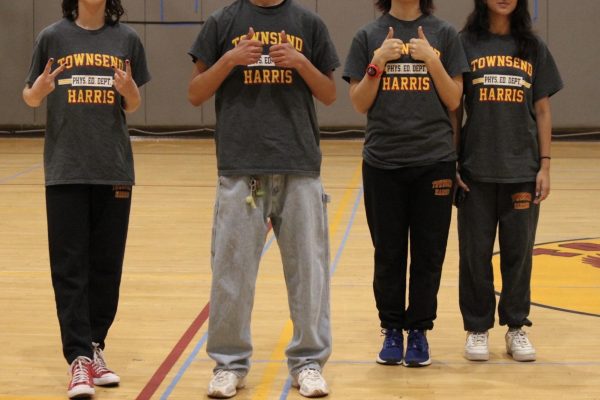We Dawdle, We Lecture, We’re Pimps, Oh My!

Since the publication of this article, Mr. Canzoneri was removed from Townsend Harris following allegations of sexual misconduct. Some advised that we take down this article, but since the below perspectives might be an important artifact for anyone in the future wanting to research what happened at THHS, we have decided to leave the article up with this disclaimer. You can read about the allegations that came to light and the fallout from them here and here.
I would like to respond to Harry Petsios’ “Paying for points” article that appeared in the January edition of The Classic. The graphic underneath the article depicts the school play as one of the “paying for points” activities, and the article begins with the tantalizing but inaccurate and erroneous assertion that “it has become possible for an after-school (sic) dodgeball game to raise your English average.” I can assure you that, at least in my class, such an idea is absurd.
I direct the annual spring musical, and I teach Advanced Placement and Regents level English. I offer my students ten bonus points for attending the play and writing a review of the production. The review requires students to write approximately five to seven paragraphs on such elements of the production as costumes, music, lighting, sound, technical design and performance. In Mr. Petsios’ piece, he suggests that by offering students extra credit for attending an event, students are being rewarded “for a grade we didn’t earn.” I think ten points for a theater review is an appropriate exchange, and those points are well earned and well deserved. Mr. Petsios also asserts that he would “work harder in class” if he “sought to add 5%” to his average. I’m not quite sure how Mr. Petsios arrives at his calculations, but, at the risk of diminishing attendance at this year’s school play, I’ll disclose mine: a student’s final grade in my course is based on a system that totals 1,000 points. Ten one-thousandths is one hundredth, or 1%. A student could never earn five points on his or her final grade in my class by attending the play and writing a review.
Mr. Petsios also voices concerns over misperceived injustices towards students who cannot afford tickets or are unable to attend because of other commitments. Rest assured, Mr.Petsios, any student who cannot afford a ticket to the play is given one gratis, and those who are otherwise engaged are given an alternate assignment if they so desire. This entire process amounts to a great deal of extra, unpaid work for me; hopefully, though, it gives my student actors what they most deserve—two sold out performances where they can showcase their talents and feed their passions as performers.
Mr. Petsios labels students who participate in this “paying for points” system “uninterested grade seekers.” For many though, this lack of interest is fleeting. Every year I read play reviews from dozens of students who essentially say, “I initially went for the extra credit, but I had so much fun and I was so entertained! I’ll definitely be back next year!” I completely agree with Mr. Petsios’ notion that students should attend after school events “because they want to see their friends in their finest moments,” but that desire, while optimistic, is unrealistic. Our school is jam packed with activities, and our students lead busy lives. Sometimes, they need other incentives.
The budget for the school play eclipses $11,000.00 annually. SING! and FON tickets sell quickly and easily because each activity has over one hundred performers. As a general rule, one can arrive at a base approximation of guaranteed ticket sales by multiplying the number of performers by five. The school play generally has a cast of twenty. We need to sell at least five hundred tickets or our activity cannot continue. It really is that simple.
Mr. Petsios questions the ethics of teachers who utilize a “paying for points” system, and he calls the entire process “little more than academic prostitution.” To judge by Mr. Petsios’ misguided metaphor, teachers are pimps who somehow profit by arranging assignations between prostitues (our event) and johns (our students). Neither my wallet nor my year end performance review is bolstered by my students’ GPA or their attendance at the school play.
Mr. Petsios’ metaphor, though, is more than inaccurate—it’s downright offensive. Mr. Petsios has articulated several provocative anti-teacher sentiments via The Classic this year, and I applaud him for having the courage to speak his mind and attach his name to his opinions, especially when his classmates sometimes hide behind the safe anonymity afforded by social media. However, to judge by the last three issues of The Classic, for Mr. Petsios, many members of the THHS faculty are pimps who either talk too much (“certain courses in this school depend far too much on lecture, particularly in the Humanities Dept.” 11/26/13), or dawdle at their desks and do nothing (“Outlines are becoming little more than the idle teacher’s solution for not teaching” 12/4/13).
I have worked at Townsend Harris for eleven years, and I know most of my colleagues’ pedagogical practices well. I have a markedly different impression of the THHS faculty, and of the exemplary instruction its members provide for our school community every day.
Your donation will support the student journalists of The Classic. Your contribution will allow us to purchase equipment, support our extracurricular events, celebrate our staff, print the paper periodically, and cover our annual website hosting costs.































